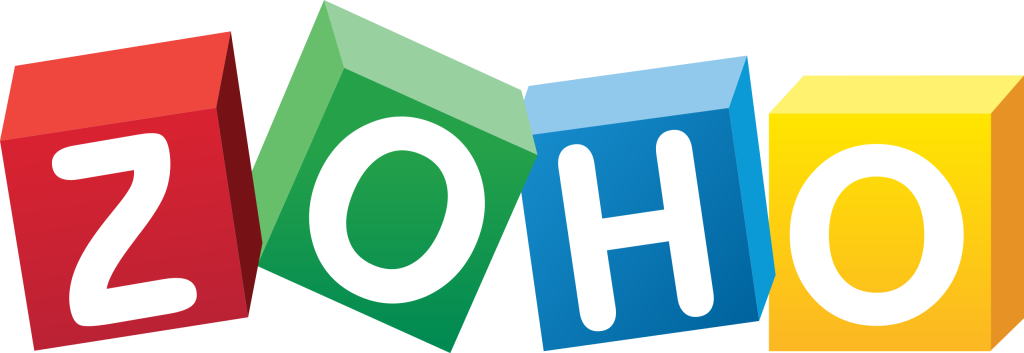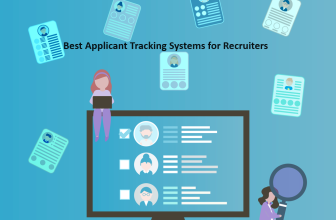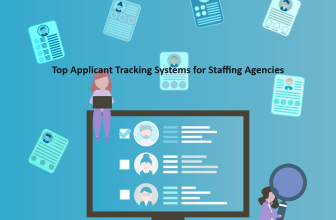With numerous CRM options in the market, it is essential to identify the one that aligns with the specific needs of construction professionals. The best construction CRM solutions are designed to tackle industry-specific challenges, such as job costing, bid management, and complex workflow automation. These tools provide a framework for managing contacts, projects, quotes, and reports, contributing to more structured and profitable business operations.
Moreover, contractors must consider CRM software that offers a high degree of customization and integration capabilities. This ensures that the CRM can grow and adapt alongside the business, incorporating other field service operations and technologies as needed. The ultimate goal is to select a CRM platform that not only assists in customer relationship management but also serves as a comprehensive tool for the contractor’s entire business ecosystem.
What we cover
What Are the Benefits of Using CRM Software for Contractors
Contractor businesses benefit significantly from CRM software, with the following being the top advantages:
- Enhanced Project Management: CRM systems facilitate better project management by allowing contractors to monitor project progress, manage price estimates, and ensure on-time delivery. This often leads to a streamlined workflow, improving the efficiency and outcome of projects.
- Automation of Tasks: CRMs automate routine tasks such as scheduling appointments and following up on leads. This automation not only boosts productivity but also allows contractors to focus more on the hands-on aspects of their work, leading to improved operations and customer satisfaction.
- Centralized Contact Management: Contractors can manage client information effectively through CRMs. With centralized contact management, they have quick access to customer data, facilitating improved customer relationship management and more personalized service.
- Lead Tracking and Sales Enablement: A CRM enables accurate lead tracking, ensuring that potential customers are engaged properly and that follow-ups are made on time, thereby increasing conversion rates and ensuring consistent business growth.
- Collaborative Work Environment: CRMs promote collaboration among team members by providing shared access to project data, which is essential for coordinated efforts. They also offer tools for real-time communication and document sharing.
- Insightful Reporting: Contractors receive reporting features with a CRM, enabling them to make data-driven decisions. These reports provide insights into customer preferences, project profitability, and other key performance indicators that can inform strategy and operations.
General Pricing of CRM Software for Contractors
Here’s a breakdown of pricing ranges for different tiers of CRM systems, tailored to the needs of contractors. Keep in mind that these figures are general estimates and can vary based on the specific provider, the number of users, and the required features.
Entry-Level CRM Systems
Entry-level CRM solutions are designed for small businesses or independent contractors who need basic functionality such as customer tracking, task management, and simple reporting. These systems are the most affordable, typically costing from $10 to $40 per user per month. They provide a solid foundation for managing customer relationships without a hefty price tag, making them an ideal choice for those just starting to utilize CRM tools.
Mid-Range CRM Solutions
Mid-range CRM software caters to small to medium-sized businesses that require more sophisticated features like sales automation, project management integration, and enhanced reporting capabilities. These platforms may also offer some degree of customization to fit business-specific needs. The pricing for mid-range CRM systems varies more widely, usually ranging from $50 to $100 per user per month. Many providers offer tiered pricing plans within this range, allowing businesses to choose the level of service that best matches their operational requirements and budget constraints.
High-End CRM Platforms
High-end CRM platforms are aimed at larger firms or those in need of highly customizable solutions, offering advanced functionalities including extensive sales and marketing automation, deep analytics, broad integration options, and often, dedicated account support. These systems are scalable and designed to accommodate business growth. Pricing for high-end CRM software is the most variable, with monthly fees typically starting at $100 to $150 per user and can go significantly higher based on customization, integration complexities, and support levels. Initial setup fees and annual contracts are common in this tier, reflecting the comprehensive service and customization options available.
Industry-Specific CRM Systems
For contractors seeking CRM solutions tailored to the construction industry or specific trades, industry-specific CRM systems integrate standard CRM functions with tools like job costing, project management, and sector-specific workflows. The cost for these specialized systems can range widely, from mid-range pricing levels of $50 to $100 per user per month to high-end solutions that may exceed $150 per user per month, depending on the feature set, customization level, and integration capabilities offered.
When evaluating CRM software costs, contractors should consider the potential return on investment (ROI) in addition to the upfront or monthly expenses. A system that offers significant efficiency improvements, enhances customer satisfaction, and drives sales growth can justify its cost over time. Moreover, many CRM providers offer free trials or demos, enabling businesses to assess the software’s compatibility with their operations before making a financial commitment.
Features to Look For in CRM for Contractors
When selecting CRM software for contractors, several key features can significantly improve efficiency and contribute to the success of their business.
- Lead Management: A good CRM should enable contractors to manage and track leads throughout the sales process. This includes capturing lead information, monitoring interactions, and organizing follow-ups to ensure leads do not fall through the cracks.
- Project Management Tools: Contractors need CRM software equipped with robust project management tools that help in scheduling, task assignments, and tracking project progress, ensuring timely completion within budget.
- Customization and Integrations: The CRM must offer customization to align with the unique needs of a contracting business. Additionally, the ability to integrate with existing systems like email, accounting, or ERP solutions is crucial for streamlining operations.
- Analytics and Forecasting: Real-time analytics aids contractors in making data-driven decisions, while forecasting tools help anticipate future business trends and resource requirements.
- Payment Processing: Incorporating payment processing within the CRM platform simplifies the transaction process for both the contractor and the client, leading to improved cash flow management.
Top Recommendations
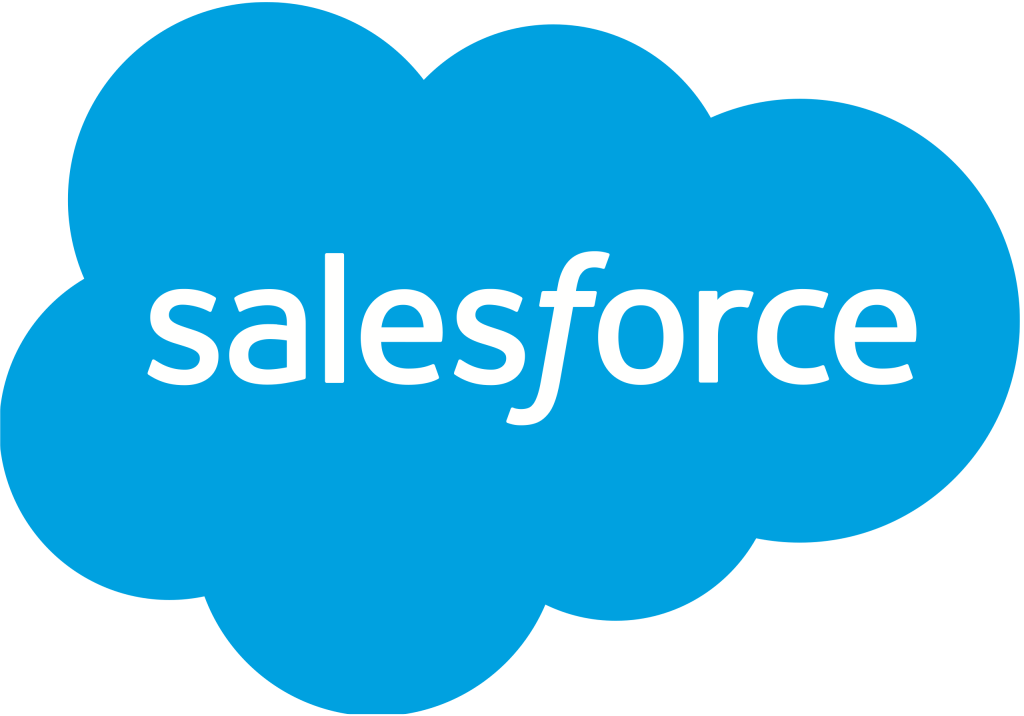
Salesforce is a leading cloud-based CRM platform that empowers businesses to enhance customer relationships and drive growth.
Best CRM Software for Contractors
Each CRM solution listed below is tailored to cater to specific needs of construction companies, from improving scheduling and document management to facilitating client communication and handling quotes.
Best CRM Software for Contractors (At a Glance)
| Software | Focus Area | Key Features | Best For |
|---|---|---|---|
| FieldPulse | Field Service Management | Job scheduling, Invoicing, CRM, Estimates | Service businesses, Small to medium contractors |
| MarketSharp | CRM and Marketing Automation | Lead management, Marketing automation, Performance tracking | Remodelers, Home improvement professionals |
| AccuLynx | Roofing and Exterior Contracting | Lead management, Job costing, Project management | Roofing and exterior contractors |
| Buildr | Construction Management | Project management, Document management, CRM for contractor relationships | Large scale contractors, Construction managers |
| ServiceM8 | Service-based Contractors | Job scheduling, Estimates, Invoicing, Customer communication | Service-based businesses (e.g., plumbing, HVAC) |
| CoConstruct | Custom Home Builders & Remodelers | Client & project management, Financial management, Communication tools | Custom home builders, Remodelers |
| Buildertrend | Construction Project Management | Project scheduling, Customer management, Document and photo storage | Builders, Remodelers, Construction firms |
| JobNimbus | Construction and Exterior Contracting | CRM, Project management, Task and schedule management | Construction, Roofing, Exterior contracting |
| Insightly | CRM and Project Management | Project tracking, Email integration, Mobile access | Small to mid-sized businesses |
| Pipedrive | Sales Management | Sales pipeline management, Email integration, Activity reminders | Small to medium businesses with sales teams |
| Zoho CRM | General CRM | Sales automation, Marketing automation, Artificial Intelligence | Small to medium-sized businesses |
| HubSpot CRM | General CRM | Contact and deal management, Marketing tools, Sales automation | Businesses of all sizes |
| Salesforce | Comprehensive CRM | Sales and service automation, Marketing cloud, Customizable platform | Businesses of all sizes, across various sectors |
1. FieldPulse
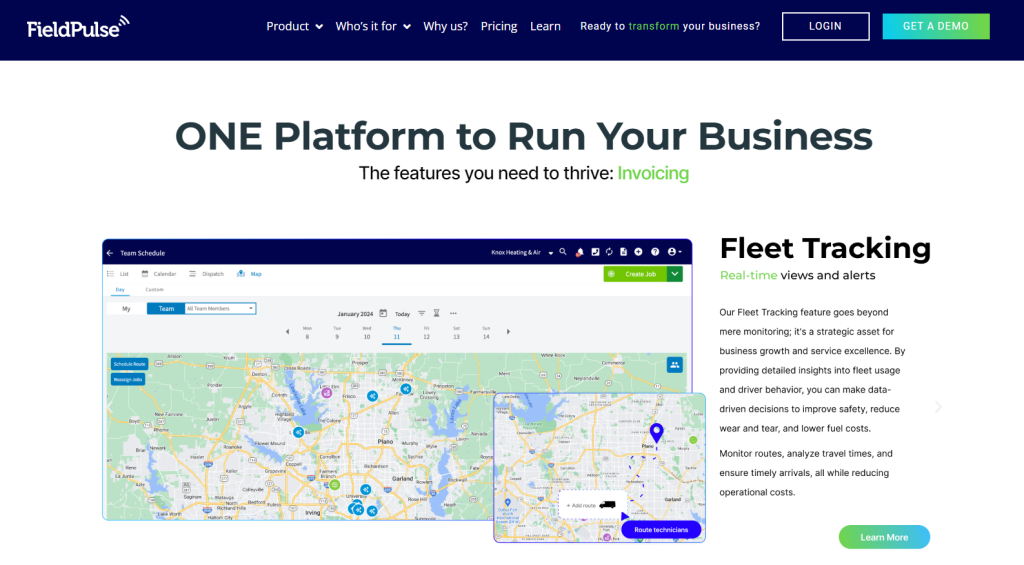
Key Features:
- Mobile access for on-the-go project management
- Scheduling and job tracking capabilities
- Client information management
Rating: 4.1/5
Pros:
- Comprehensive mobile app for field teams
- Real-time updates on scheduling
- User-friendly interface for client information entry
Cons:
- Limited third-party integrations
- May not scale well for very large businesses
- Advanced features may require a learning curve
Pricing: Starts from $65 per month
FieldPulse serves as a comprehensive field service management solution designed to help service businesses operate more efficiently.
This software excels in offering features like job scheduling, customer management, estimates, invoicing, and a mobile app that allows technicians to manage their tasks on the go.
The reason FieldPulse stands out is its user-friendly interface and the ability to customize features to fit the specific needs of businesses ranging from plumbing and HVAC to electrical services.
It’s particularly beneficial for small to medium contractors looking to digitalize their operations, improve customer satisfaction, and streamline communication within their teams.
Verdict: FieldPulse stands out for contractors who prioritize mobility and ease of use in project and client management.
2. MarketSharp
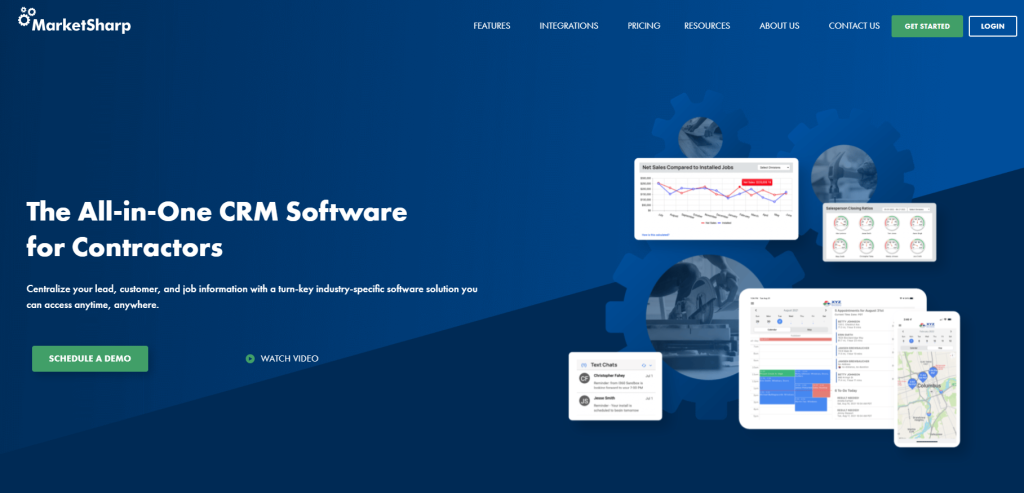
Key Features:
- Targeted marketing campaigns
- Customer management
- Performance tracking and reporting
Rating: 4.0/5
Pros:
- Tools specifically tailored for remodelers and home improvement contractors
- Automated marketing functionality
- Robust analytics for tracking performance
Cons:
- Interface not as modern as competitors
- Initial setup can be time-consuming
- Some features may exceed the needs of small companies
Pricing: Quoted upon request
MarketSharp is a specialized CRM and marketing automation platform tailored for remodelers, contractors, and home improvement professionals.
It provides robust tools for lead management, customer relationship management, and performance tracking to help businesses increase sales and streamline their marketing efforts.
The platform’s strength lies in its ability to automate workflows, track lead sources, and analyze marketing ROI, making it an invaluable tool for businesses aiming to grow their customer base and improve operational efficiency.
Verdict: MarketSharp is reliable for contractors looking to boost their marketing efforts and streamline customer management.
3. AccuLynx
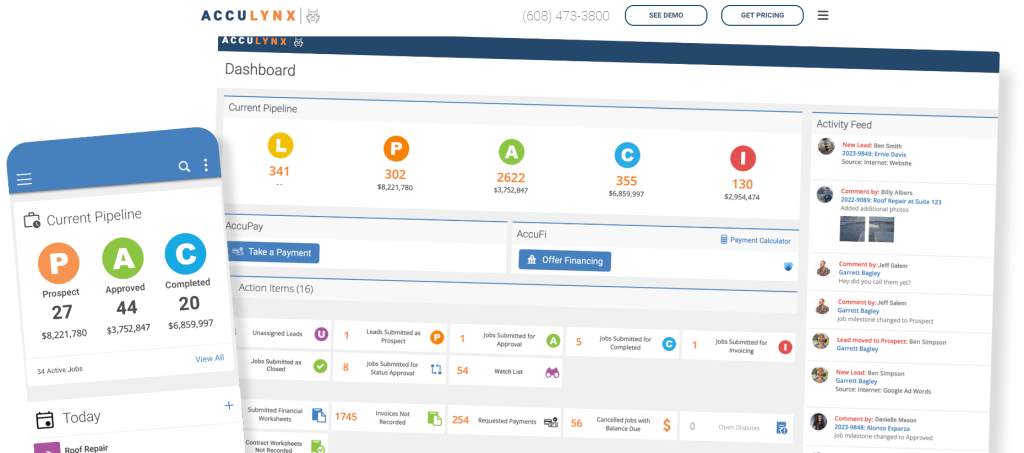
Key Features:
- Job scheduling and resource management
- Insurance claim tracking
- User-friendly dashboard for project visibility
Rating: 4.2/5
Pros:
- Strong focus on roofing contractors
- Streamlines the insurance claims process
- Excellent project visibility tools
Cons:
- Priced higher than some alternatives
- Limited international features
- Can be complex for small-scale users
Pricing: Pricing plans are tiered, starting from approximately $99 per user per month
AccuLynx is specifically designed for roofing and exterior contracting businesses. It offers comprehensive project management features, including lead management, job costing, material ordering, and real-time team communication.
AccuLynx’s best-selling point is its ability to streamline the entire project lifecycle from initial contact to final invoicing, making it easier for contractors to manage multiple projects efficiently and improve profitability.
Its integration with major suppliers and aerial measurement services further enhances its appeal to the roofing industry.
Verdict: AccuLynx is specialized for roofing contractors who need robust job scheduling and claim management tools.
4. Buildr
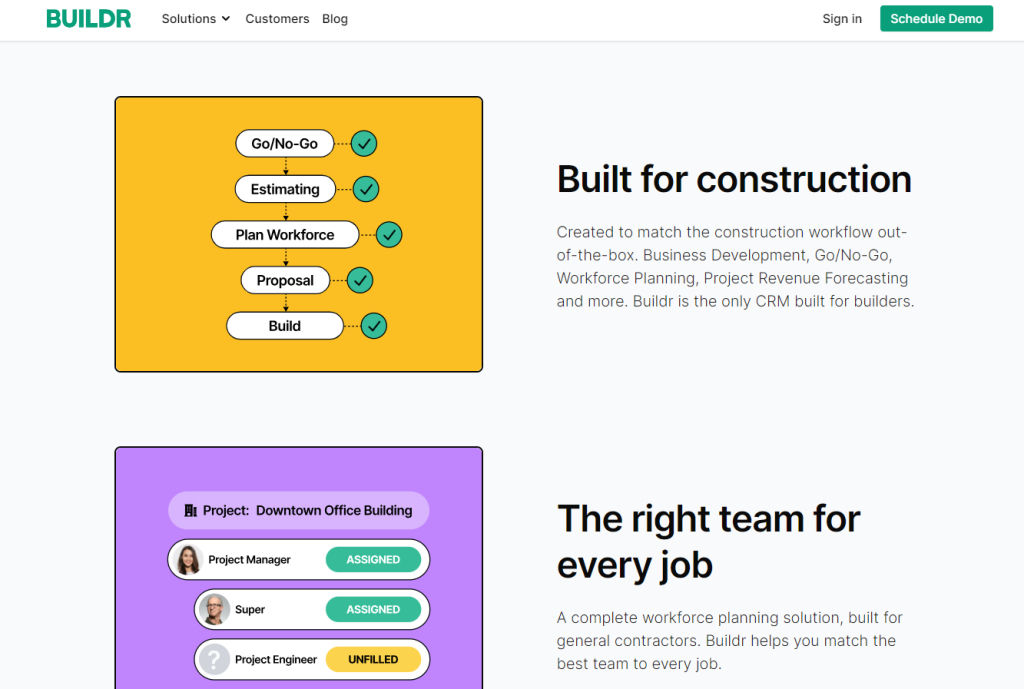
Key Features:
- Construction management
- Collaboration tools
- Comprehensive document management system
Rating: 4.5/5
Pros:
- Extensive collaboration and document management capabilities
- Suitable for large-scale construction projects
- High level of project tracking and visibility
Cons:
- High cost can be prohibitive for smaller businesses
- Learning curve for new users
- The sheer number of features can be overwhelming
Pricing: Custom pricing based on the needs of the company
Buildr is a leading construction management software, offering a wide range of features such as project management, document management, and quality and safety tools.
It is designed to facilitate collaboration among project teams, streamline communication, and improve document control across the entire project lifecycle.
Buildr’s platform is highly scalable, making it suitable for projects of any size, from small renovations to large-scale construction projects.
Its ability to integrate with other tools and software adds to its versatility and effectiveness in managing complex construction projects.
Verdict: Buildr excels in construction management for larger companies needing advanced collaboration and document management.
5. ServiceM8
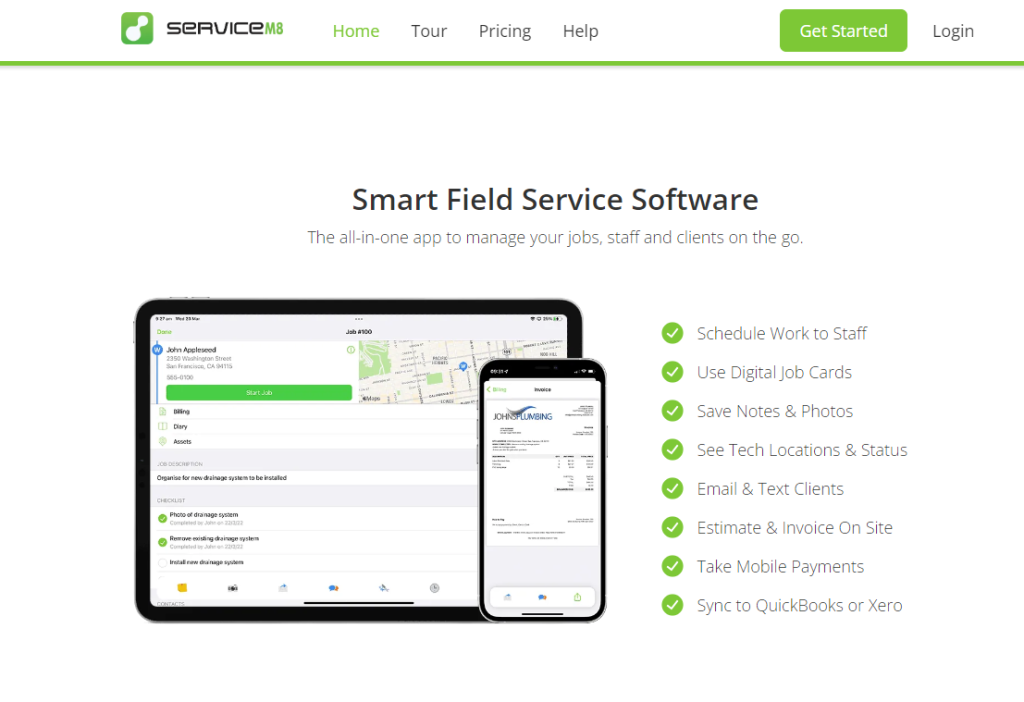
Key Features:
- Client communication tools
- Invoicing and quotes
- Job scheduling
Rating: 4.3/5
Pros:
- Intuitive design for quotes and invoicing
- Efficient communication channels with clients
- Good integration for job scheduling
Cons:
- Primarily designed for small to medium businesses
- Reporting features could be more advanced
- Limited customization options
Pricing: Starts at $9/month for the Lite plan
ServiceM8 is designed for service-based businesses, offering tools for job scheduling, quotes and estimates, invoicing, and customer communication.
Its key advantage is the simplicity and effectiveness with which it enables businesses to dispatch jobs, communicate with clients, and manage billing.
ServiceM8’s integration with cloud accounting software like QuickBooks and Xero streamlines financial management, making it an excellent choice for small businesses in industries such as electrical, plumbing, and cleaning services.
Verdict: ServiceM8 is ideal for small to medium contractors seeking to improve client communication and manage invoicing effectively.
6. CoConstruct
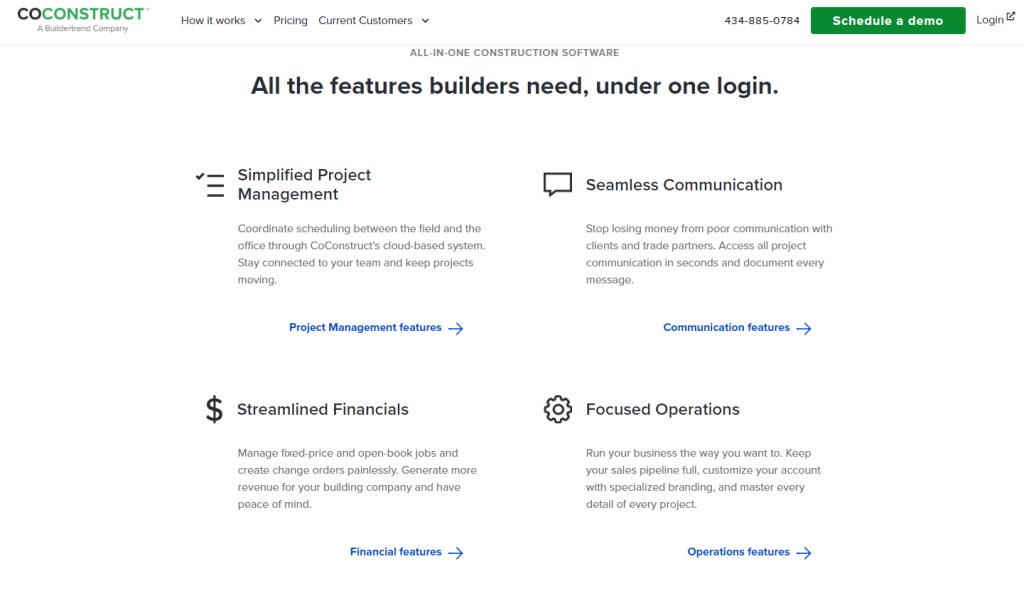
Key Features:
- Project management
- Financial management
- Client coordination
Rating: 4.4/5
Pros:
- Strong focus on custom builders and remodelers
- Comprehensive project and financial management features
- Facilitates client coordination with ease
Cons:
- Can be costly for smaller operations
- The interface may require training
- Some users report minor bugs
Pricing: Starts from $99 per month
CoConstruct is tailored for custom home builders and remodelers. It offers an integrated suite of management tools covering project, client, and financial aspects of construction projects.
CoConstruct excels in facilitating client communication, customizing options selections, and managing project finances in real-time.
Its ability to centralize communication and documents makes it a vital tool for builders looking to enhance client satisfaction and streamline project management.
Verdict: CoConstruct is tailored for custom builders requiring detailed project management and financial tracking.
7. Buildertrend
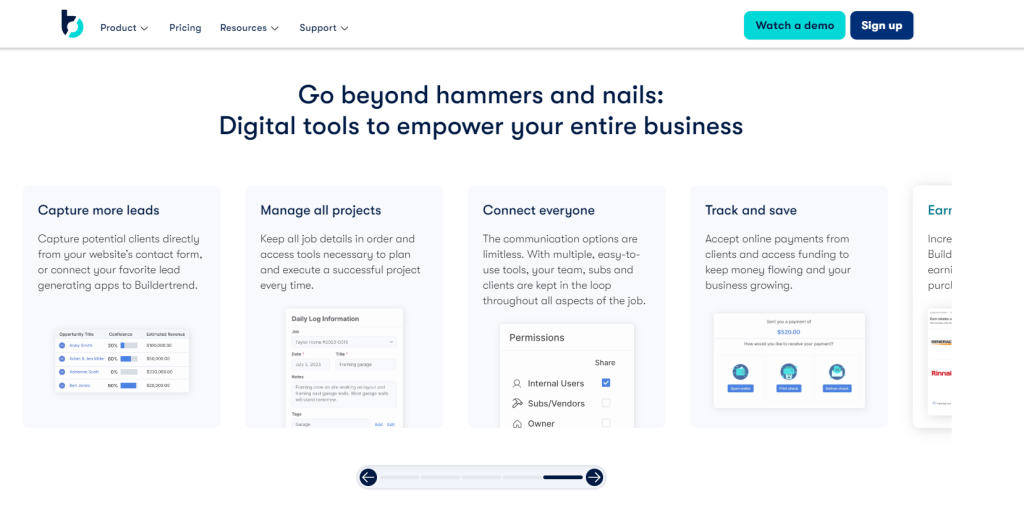
Key Features:
- Pre-sales process management
- Project management
- Customer management
Rating: 4.2/5
Pros:
- Comprehensive pre-sales process organization
- Effective project management tools
- Good customer management features
Cons:
- It can be expensive for start-ups and very small businesses
- Mobile app could use improvements
- Steep learning curve for less tech-savvy users
Pricing: Custom pricing available upon request
Buildertrend is a construction project management software designed for home builders, remodelers, and specialty contractors.
It offers features such as project scheduling, project management, customer management, and financial management tools.
Buildertrend’s comprehensive platform supports pre-sale processes, project management, financial tools, and customer management, making it an all-in-one solution for construction businesses aiming to improve project delivery and increase customer engagement.
Verdict: Buildertrend offers a complete suite of management tools favorable for mid to large construction firms seeking robust pre-sales and project management facilities.
8. JobNimbus
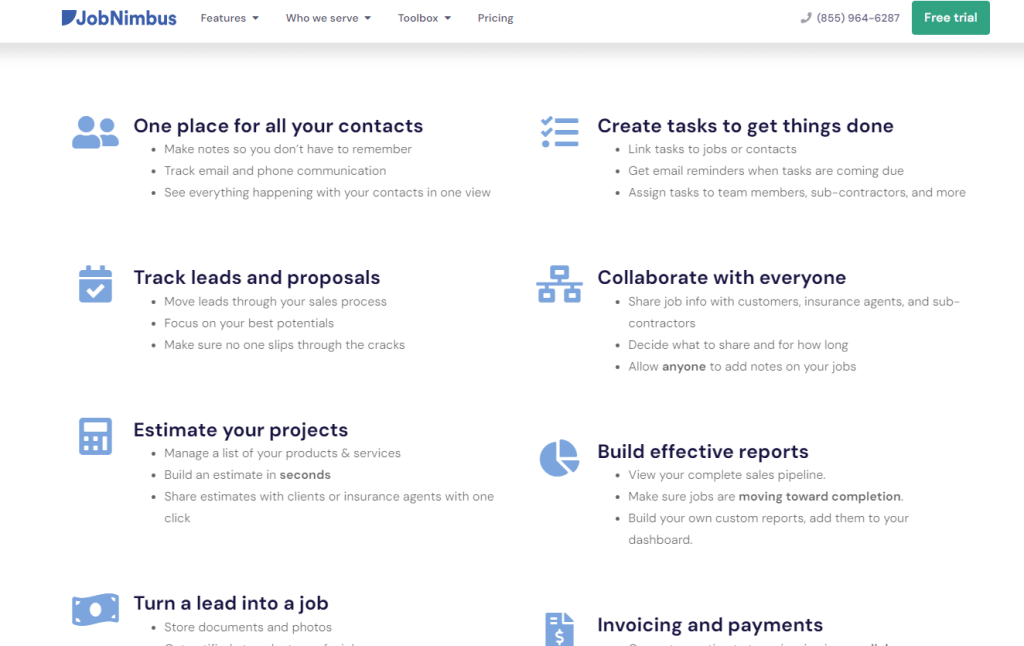
Key Features:
- Sales management
- Office management
- Job scheduling
Rating: 4.2/5
Pros:
- Helpful for both sales and office management
- User-friendly job scheduling
- Strong customer support
Cons:
- Reporting can be more robust
- Customization has limitations
- The interface isn’t the most modern
Pricing: Starts at $25 per user per month
JobNimbus is a versatile CRM and project management tool designed for the construction and exterior contracting industries.
It combines simplicity with powerful features for task management, scheduling, document storage, and customer management.
JobNimbus’s customization options allow businesses to tailor the software to their specific workflows, making it a flexible tool for companies looking to improve organization, efficiency, and communication within their teams.
Verdict: JobNimbus is recognized for blending versatility in sales and office management with effective job scheduling.
9. Insightly
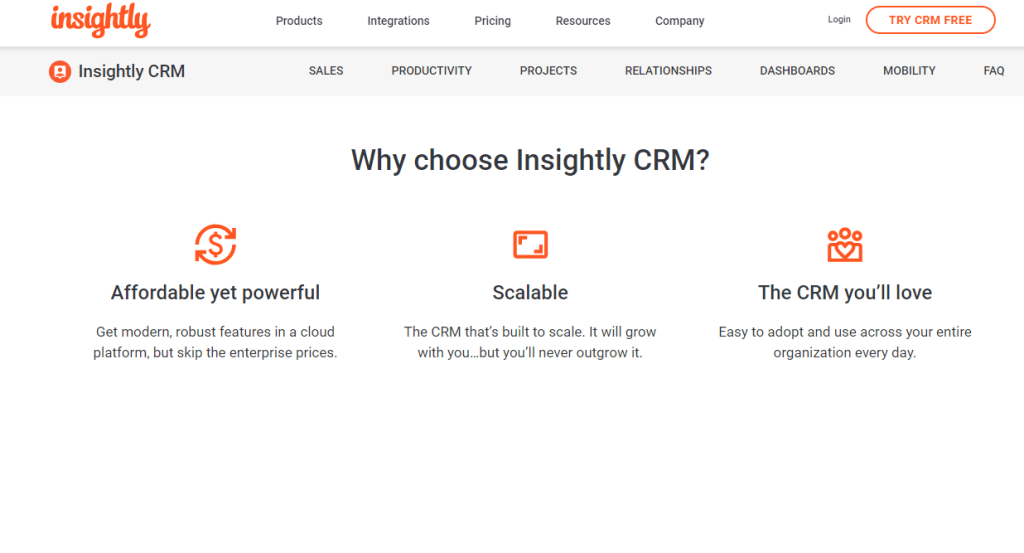
Key Features:
- Project tracking
- Customer relationship management
- Delivery pipeline management
Rating: 4.0/5
Pros:
- Solid project tracking abilities
- Strong CRM to maintain customer relationships
- Provides a clear view of the delivery pipeline
Cons:
- The user interface can be more intuitive
- Limited marketing automation features
- Some integrations may require technical know-how
Pricing: Free plan available; paid plans start at $29 per user per month
Insightly offers CRM and project management capabilities designed to help small to mid-sized businesses manage customer interactions and projects efficiently.
It features lead and contact management, sales opportunities, project management, and customizable reports.
Insightly’s strength lies in its integration capabilities, allowing businesses to connect the CRM with a wide range of apps and services, enhancing productivity and providing a unified view of customer interactions and project statuses.
Verdict: Insightly is noted for project tracking and maintaining strong customer relationships, suitable for a range of contractors.
10. Pipedrive
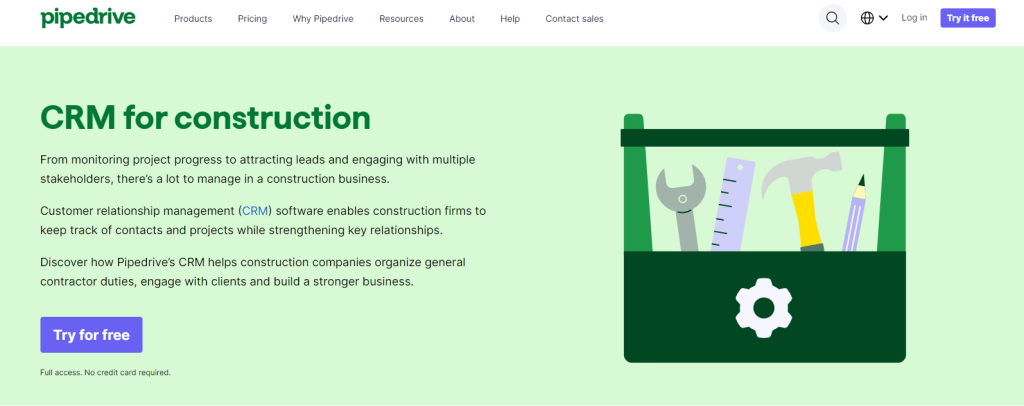
Key Features:
- Pipeline management
- Sales automation
- Activity and goal tracking
Rating: 4.5/5
Pros:
- Intuitive pipeline management interface
- Robust sales automation tools
- Helps in tracking activities and achieving sales goals
Cons:
- Reporting could be more detailed
- May lack depth in post-sales features
- Limited customization for advanced users
Pricing: Starts at $15 per user per month
Pipedrive is a sales management tool focused on helping small to medium-sized businesses manage their sales processes.
Its intuitive interface and focus on sales pipeline management make it easy for sales teams to track deals, manage leads, and optimize their sales processes.
Pipedrive’s customization options, detailed reporting, and automation capabilities are key features that help businesses streamline their sales activities and focus on closing more deals.
Verdict: Pipedrive is distinguished for its user-friendly sales pipeline management and automation capabilities, serving sales teams effectively.
11. Zoho CRM
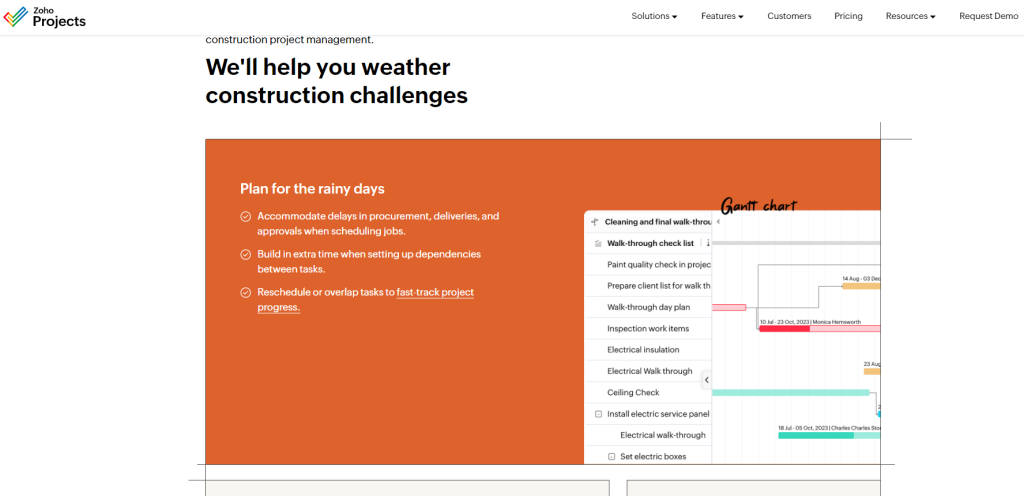
Key Features:
- Multi-channel support
- Sales automation
- CRM for client management
Rating: 4.3/5
Pros:
- Strong multi-channel support enhances customer interaction
- Advanced sales automation streamlines the sales process
- Comprehensive CRM for efficient client management
Cons:
- Can be complex to fully utilize without training
- The mobile app could offer more offline functionalities
- Integration with other tools may require technical assistance
Pricing: Free version available; paid versions start at $14 per user per month
Zoho CRM is a comprehensive CRM solution suitable for small to medium-sized businesses. It offers sales automation, marketing automation, contact management, and a plethora of integrations.
Zoho CRM’s artificial intelligence, analytics, and customization options make it a powerful tool for businesses looking to automate their sales processes, understand customer preferences, and engage with customers across multiple channels.
Verdict: Zoho CRM excels in providing sales automation and client management through multi-channel support, favorable for contractors prioritizing diverse customer interactions.
12. HubSpot CRM
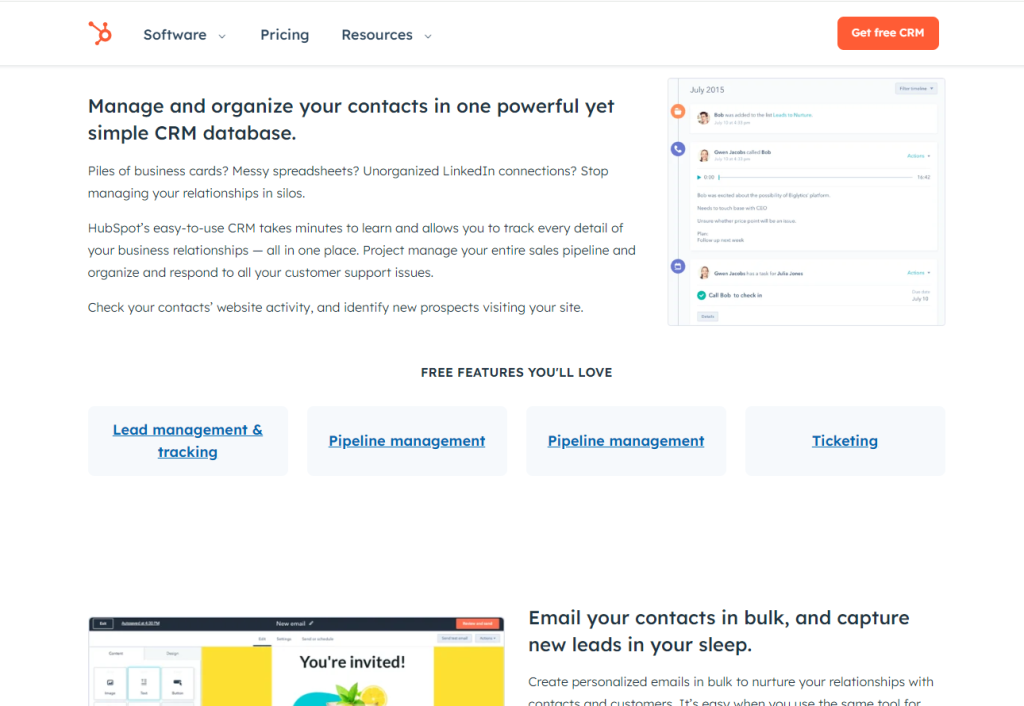
Key Features:
- Inbound marketing tools
- Sales automation and content management
- Lead management and customer insights
Rating: 4.6/5
Pros:
- Free to use with a suite of powerful marketing tools
- Seamless automation and content management for sales
- Provides insightful lead management capabilities
Cons:
- Paid add-ons can be expensive for full functionality
- Advanced features require a learning curve
- Not as construction-specific as other options
Pricing: Free plan available; additional features can be added a la carte
HubSpot CRM is known for its user-friendly interface and is designed to help businesses of all sizes manage their sales, marketing, and customer service.
It offers contact and deal management, email tracking, and a rich set of integrations.
HubSpot CRM stands out for its extensive suite of free tools and scalability, making it an excellent choice for startups and enterprises alike looking to grow their businesses without significant upfront investment.
Verdict: HubSpot CRM is renowned for its solid inbound marketing tools and valuable lead management for contractors of all sizes.
13. Salesforce
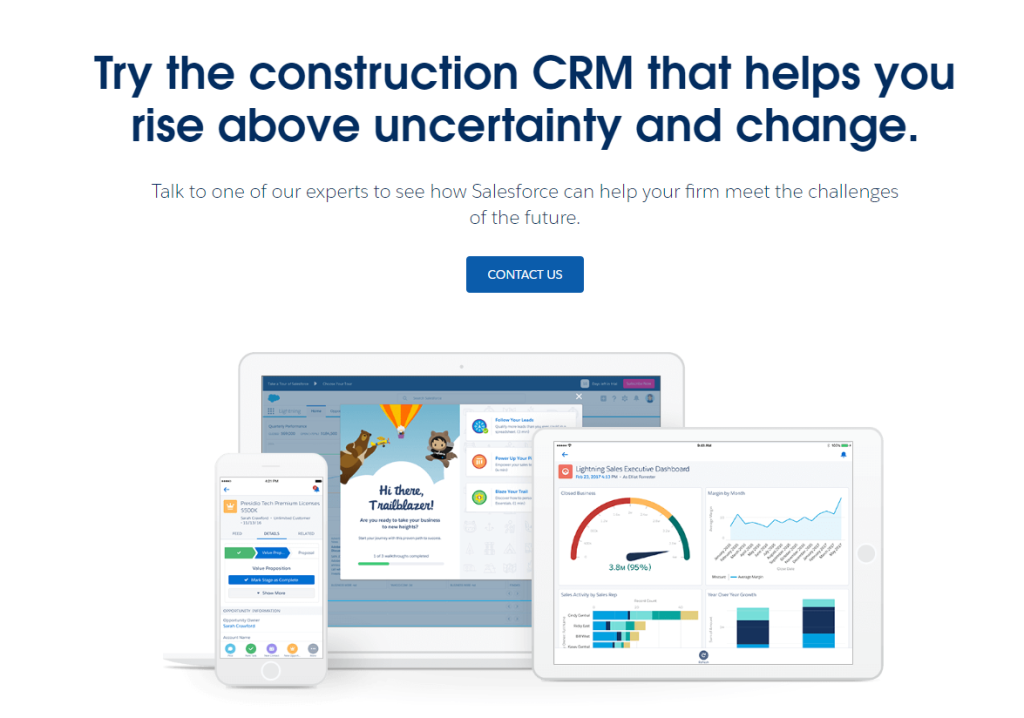
Key Features:
- Comprehensive sales management
- Extensive customization options
- Wide range of integrations
Rating: 4.5/5
Pros:
- Leading solution for extensive sales management needs
- Highly customizable to fit various business processes
- Supports a vast array of integrations with other platforms
Cons:
- The pricing can be high for the full suite of features
- Can be overwhelming for small businesses
- Requires training for effective usage
Pricing: Starts at $25 per user per month
Salesforce is a leader in the CRM market, offering a highly customizable platform to support sales, service, marketing, and more.
Its comprehensive set of features, including sales automation, customer service tools, marketing automation, and an extensive ecosystem of apps and integrations, makes Salesforce a powerful solution for businesses of all sizes across various industries.
Salesforce’s scalability and flexibility are unmatched, allowing businesses to tailor the platform to their specific needs and grow with them over time.
Verdict: Salesforce is a top-choice CRM for its powerful sales management and extensive integration capacity, aimed at contractors looking for a scalable, robust CRM system.
FAQs
How does CRM software help with project estimation and bidding processes?
CRM software streamlines the estimation and bidding process by enabling contractors to schedule meetings, generate and send quotes, and secure signatures efficiently. These tools centralize project data, making it easier to create accurate and competitive bids that reflect the scope of work.
Can CRM solutions improve client relationships for small construction businesses?
Small construction businesses benefit from CRM solutions by enhancing communication with clients through real-time information sharing. These systems support better lead management and project tracking, thereby improving overall customer satisfaction by meeting client expectations promptly and accurately.
Which CRM platforms offer robust management tools for general contractors?
General contractors usually look for CRM platforms that have comprehensive project management features. These features include task tracking, budgeting, and billing. Solutions like Builder Prime, Procore, and Nutshell offer a centralized database. This allows for better control and decision-making throughout the lifecycle of a construction project.



